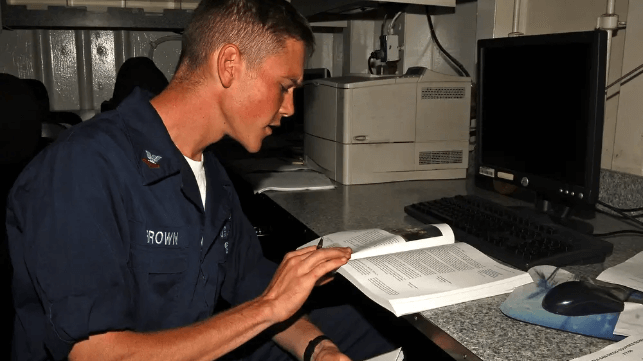Op-Ed: US Navy Needs to Expand Access to Education for Enlisted Sailors

[By Petty Officer 2nd Class Richard Rodgers]
In the U.S. Navy, maritime superiority and the readiness of its warfighters have always been paramount. Admiral Franchetti acknowledges the importance of a culture of innovation and improvement to maintain our warfighting edge in an ever-evolving threat environment. However, it is imperative that the U.S. Navy extends these principles to enlisted Sailors by reinforcing and expanding their educational opportunities. Enlisted Sailors play a critical role in achieving and maintaining maritime superiority, and they must be empowered to become full, active, and informed participants in the U.S. Navy’s mission.
While the U.S. Navy rightly focuses on leadership and problem-solving, enlisted Sailors often feel left behind. Many struggle to complete even a few college classes a year due to underfunded tuition assistance and overworked scheduling. This issue is further exacerbated by the fact that officers frequently pursue numerous advanced degrees, only to leave the U.S. Navy and take their knowledge with them. This discrepancy in educational opportunities between officers and enlisted Sailors hinders the overall readiness of the U.S. Navy and diminishes the potential for enlisted personnel to contribute more effectively to the mission.
Education is not just a personal endeavor, it is vital for the U.S. Navy’s success. Enlisted Sailors are on the front lines, operating and maintaining complex equipment, and executing mission-critical tasks. To excel in these roles, they require a deeper understanding of their responsibilities, technical skills, and the broader context in which they operate. Furthermore, they must be able to adapt to new challenges and technologies as the U.S. Navy evolves. Educational opportunities can equip them with the knowledge and critical thinking skills necessary to do so. To reinforce and expand educational opportunities for enlisted Sailors, the U.S. Navy should consider several key steps.
Increase tuition assistance funding. The U.S. Navy should allocate more resources to tuition assistance programs, ensuring that enlisted Sailors have access to affordable education. By removing financial barriers, the U.S. Navy can encourage more personnel to pursue higher education.
Incorporate more flexible scheduling. Enlisted Sailors often face demanding schedules that make it difficult to attend traditional classes. The U.S. Navy should explore flexible scheduling options, such as online courses or partnerships with local educational institutions, to accommodate the availability of its personnel.
Integrate education with career paths. Educational opportunities should be integrated with the specializations and career progressions of enlisted Sailors. Enlisted Sailors should have clear pathways to earn degrees or certifications that align with their roles and responsibilities, helping them grow professionally and contribute more effectively to the U.S. Navy’s mission.
Improve knowledge retention and exchange. To address the issue of officers leaving the U.S. Navy with advanced degrees, the U.S. Navy could incentivize officers to share their knowledge and mentor enlisted personnel. This can be done through structured mentorship programs and knowledge transfer initiatives.
Reward and recognize educational initiative. The U.S. Navy should recognize and reward enlisted Sailors who invest in their education and demonstrate a commitment to self-improvement. This can include promotions, bonuses, and other incentives to encourage continuous learning.

that matters most
Get the latest maritime news delivered to your inbox daily.
In the pursuit of maritime superiority, the U.S. Navy must prioritize the education and empowerment of its enlisted Sailors. These dedicated individuals are the backbone of the U.S. Navy, and their success directly contributes to the U.S. Navy’s overall readiness and effectiveness. By reinforcing and expanding educational opportunities for enlisted Sailors, the U.S. Navy can ensure that they become full, active, and informed participants in the mission. This investment in education will not only benefit the enlisted Sailors themselves, but will also strengthen the U.S. Navy as a whole, ensuring its readiness for the challenges of the future.
Petty Officer 2nd Class Richard Rodgers is a mass communication specialist in the U.S. Navy. He is currently stationed at Navy Public Affairs Support Element, the Navy’s premiere expeditionary public affairs command, where he has served as the Creative Director. He previously served as the Communications Director for Carrier Strike Group 10 Public Affairs and as a content developer at Defense Media Activity.
The opinions expressed herein are the author's and not necessarily those of The Maritime Executive.
